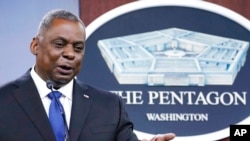Defense Secretary Lloyd Austin rolled out a departmentwide effort Wednesday aimed at more effectively addressing China as the “pacing challenge” for the U.S. military.
While some of the initiatives will remain classified, defense officials told reporters the effort puts new organizational structures in place to better prioritize competition with China and to make sure the challenges in the Indo-Pacific region are “gaining the attention they deserve.”
“It's an assessment of how the department's doing with respect to truly treating China as the number one pacing challenge, and the task force found some gaps and seams, some things that we could be doing better,” Pentagon press secretary John Kirby said.
The effort is not a “new strategy or change of direction from where the Biden administration has been to date,” according to another defense official who spoke to reporters Wednesday.
“This directive from the secretary is ultimately about getting the department's house in order, ensuring that the department lives up to the stated prioritization of China as the number one pacing challenge,” the defense official said.
The initiatives are based on the Pentagon’s China Task Force, which was established in February to review the department’s China-related policies and spotlight top priorities. The group reviewed thousands of pages of documents, interviewed current and former defense officials, and consulted other government agencies along with Congress, according to officials.
'Ascending power'
During his confirmation hearing in January, Austin told lawmakers China is an "ascending power" and "the most concerning competitor that we're facing."
U.S. officials have consistently raised concerns about what they say is China's industrial espionage, its theft of biomedical information and the potential manipulation of technology, like 5G cellular networks.
Bradley Bowman, a defense expert with the Foundation for Defense of Democracies, told VOA that anything the Pentagon does “to bring a more laser focus” on resourcing and strategy on China is a good thing.
However, he criticized the Pentagon effort for lacking “the simple things” such as “giving the Indo-PACOM [Indo-Pacific] commander what he says he needs.”
“Unfortunately, in the budget request that just went to [Capitol] Hill a short while back, many of the things that Indo-PACOM said that it needs were either absent or underfunded,” Bowman said.
VOA's Jeff Seldin contributed to this report.

